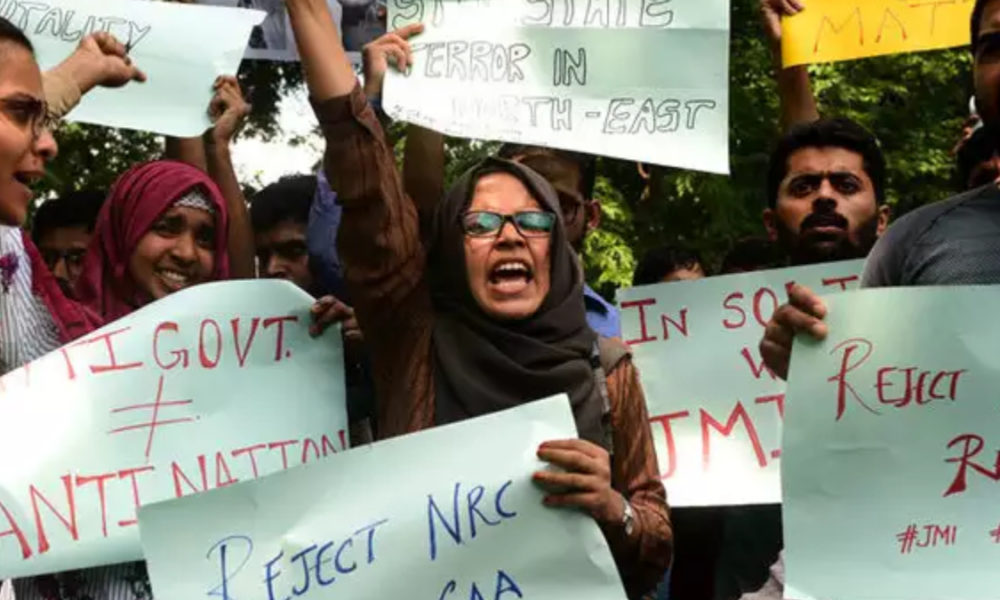Convergence of Islamic political thought and Left-wing ideology is nothing new, it has been there for ages in several countries. In India too these two ideologies got along quite well for a mutually beneficial relationship in some states — to name a few, West Bengal and Kerala. Of late, the bonhomie has manifested itself quite dangerously and so it needs greater attention.
It would not be incorrect to say in the present socio-political scenario Indian Muslims are placed in a precarious situation. They have been looking for a shoulder to cry on. Due to their growing mistrust with the Congress, the AAP and other political parties, they have limited options, thus making them vulnerable to incline towards the readily available Left-wing support.
This understanding suits the Left-wing as well for achieving a bigger support base in the country and achieving their larger goals. Both preach casteless society but they cannot be described as natural partners. While several generations of communists have practised atheism and have been consistently working for a casteless society no matter what the cost be. The Muslims, on the other hand, are taught to be God-fearing and having unwavering trust in Allah. Nevertheless there is a growing proximity between the two ideologies.
Support from the Muslim community, coupled with displacement of migrant labours during Covid-19 lockdown with some disenchantment with the government, could have a considerable potential in strengthening the Left ideology. The possible resurgence of this strengthened ideology, which had been weakening over the decades, should be a cause of worry for the Indian dispensation. It is a known fact that ultra-Left ideology has been energising Maoists and Naxals in Jharkhand, Chhattisgarh, Odisha, Maharashtra and Andhra Pradesh.
Earlier this week Delhi Police filed chargesheets in the Delhi riots which broke out during protests against the Citizen Amendment Bill and the National Register for Citizens. During the riots more than 53 people lost their lives and more than 400 were injured in the capital alone. Delhi Police investigation into the causation of those riots has brought on record the undercurrents of coming together of Indian Muslims and the ultra-Leftist ideology. The police investigations revealed that the seeds of riots were sown just before the arrival of US President Donald Trump with an intention of embarrassing India. A narration of subjugation of Indian Muslims was playing out much ahead of the US President’s arrival. Ultra-Left activists found an opportunity in the POTUS’ visit by carrying out their ideological warfare by arousing Muslim sentiments.
According to the police, Umar Khalid’s speech in Aurangabad was the tipping point; in his speech he reportedly made an appeal to Muslims to coincide their protests in connection with the Citizen Amendment Bill around the US President’s visit. The outreach of the extreme Left leader became a tool for ideological warfare against capitalist US and Right-wing India.
In the past Umar Khalid, a former Democratic Students’ Union student from prestigious Jawaharlal Nehru University with a PhD degree, has been on the wrong side of the law for some time now. He was also involved in JNU sedition row, in which protests were held against hanging of 2001 Parliament attack convict Afzal Guru. Khalid has been involved in several other problematic political protests against the government.
Following Umar Khalid’s speech a number of protests happened in Delhi in February this year. These protests spread to about 22 sites in the capital. The protest sites were managed by Jamia Coordination Committee. The traction of Muslim protests in Shaheen Bagh protests became an encouragement for nation-wide agitation against CAA and NRC. Indian Muslims were heavily influenced by the Leftist affection to anti-establishment tactics.
The Jamia Coordination Committee, as per police probe, consisted of 17 groups including extreme Left Popular Front of India, AISA and Pinjara Tod. Several members of these groups, who reportedly played a major role in Delhi riots, have now been arrested by Delhi Police. Popular Front of India has already been under government scrutiny for its anti-government activities.
Pinjara Tod group was involved in management of Muslim-dominated protest sites at Seelampur and Chand Bagh. Both these areas witnessed bloody riots this year leading to heavy loss of life and property. Inquiries revealed that Pinjara Tod group was instrumental in provocation of Muslims protesting at Seelampur, a Muslim-dominated area to move towards Jaffrabad, which has mixed community of both Hindus and Muslims. When the protestors moved to Jaffrabad and blocked the road Hindu community, Hindus were infuriated and thus it became a flashpoint, triggering the riots in various other parts of Delhi. The police have also attributed violence in Jamia Millia Islamia University and Darya Ganj to the Left-wing instigation.
During all these occurrences what has worried the police most is that ultra-Left “conspiracy” of instigating the Muslims had a nationwide intent of causing unrest to cause anarchy. In the past, the government had cracked down and rounded up several Left-oriented intellectual leaders following police investigations into the Bhima Koregaon incident. Several activists including writer and poet Varavara Rao, lawyer and activist Arun Ferreira and Gautam Naulakha having alleged links with Maoists were arrested in 2019.
Interestingly, in the Delhi riots, what the police have so far not been able to put on record the provocation through their speeches and statements by certain BJP leaders such as Kapil Mishra, Parvesh Verma and Anurag Thakur. Their utterances, it cannot be denied, caused polarisation and were instrumental in bringing together the Left and sizeable population of Indian Muslims together.
The protests fuelled by the statements of BJP leaders had a powerful influence of Left ideology. During CAA protests, a temporary faculty member of IIT Kanpur took the issue of communist poet Faiz Ahmed Faiz’s famous poem “Hum dekhenge”, being sung by protesting students in the campus, and alleged it to be anti-Hindu. The IIT instituted a commission to look into the issue. The student media body rejected the charges as being misinformed and communal, which divorced the poem from its societal context.
“Hum Dekhenge” was a famous poem of renowned Pakistani Urdu communist poet Faiz Ahmed Faiz. The Marxist poet was nominated for Nobel Prize in Literature and won the Lenin Peace Prize. His poem goes: Hum Dkhenge, Hum Dekhenge… Jab zulm-o-sitam ke koh-e-garan, rooi ki tarha ur jayenge…hum mehkoomon ke paaon tale, ye dharti dhar dhar dharkegi.
This gist of the poem highlights subjugation by those in power. It was composed as a medium of protest against Pakistani President Zia-ulHaq’s oppressive regime, which came into power after elimination of Pakistan Prime Minister Zulfikar Al Bhutto, who was essentially a socialist. The poem gained rapid cult following as Leftist song of resistance and defiance worldwide. The song has become so popular that it has been rendered by new age singers in popular show Coke Studio.
During Delhi protests we also saw JNU students come out in support of Jamia Millia Islamia students, who alleged police brutality following a “peaceful” protest in the campus. The police however claimed that the Jamia students pelted stones at them in which several policemen got injured and the followup action led to injuries to the students.
All the above mentioned events suggest a growing proximity between Indian Muslims and Leftist ideology. However, Muslims are not new to the Left ideology of socialism and communism. According to a Princeton University research, this modern concept, which involves state regulation, if not ownership, of the means of production and distribution, was introduced to the Muslim world in the 19th century, probably in Ottoman Empire during the reform period known as the Tanzimat (between 1839 and 1877).
The young Ottomans, as the reform-minded intellectuals were known, diffused the concept and doctrines of socialism among themselves, and through the media their ideas spread into Egypt and the Fertile Crescent. Socialist political groups emerged in Turkey after the collapse of the Ottoman Empire after World War I, but the regime of Mustafa Kemal Ataturk, Turkey’s President, exerted constant pressure on these entities in the early to mid1920s.
Socialism and communism were understood to be bedfellows, so the repression of the Turkish Communist Party tended to echo and extend to the socialists as well. It was only after the Turkish military coup in 1960 that Turkish socialists acquired a new lease of life.
Meanwhile, in the Arab lands of the West Asia, Egyptian, Syrian and Lebanese writers published their interpretations of European socialist thought and practice in newspaper essays and articles. By the late 1940s and the 1950s, socialism came to be examined in the context of Arab society and politics.
In Iran the cleric Mahmud Taliqani argued that the best attributes of socialism were already to be found in Islam. However Pakistani thinker Abul al-A’la Mawdudi argued that all secular ideas were inherently inimical to Islamic thought and practice. Even so, in their view, Islam introduced these same principles centuries ago, and the rest of the world was merely belatedly catching up.
Many Muslims have said that the Islamic scriptures are redolent with the themes of egalitarianism, a bedrock concept in socialism. They have also alleged that “social justice” is endemic to Islamic belief and used the expression “joint mutual responsibility” to capture the spirit of this principal.
Those responsible for crafting a theory of social justice assumed first of all that every individual is entitled to a claim of fairness. Second, they held that clearly articulated society with identifiable members must exist in order to assess whether individual members were obtaining their fair share of goods, services, and opportunities.
Third, they agreed that sophisticated measures were necessary to make that determination accurately. Fourth, they maintained an institution (ideally, the state) must be able to operate in a manner that would ensure as close an approximation to social justice as possible. Finally, they believed that rational, non-religious justifications should be provided for each individual’s claim to entitlements, presumably on the argument that religious based justifications risked omitting entitlements for those who did not profess the mainstream religion of the group.
During the Soviet era, Muslim political theorists maintained that Islam which they tended to reify, avoided the excesses of communism and capitalism. They cited scripture from Quran: “We have made you a middle most nation so that you may act as witness over man.” These Muslim writers saw a community middle way, as it were, as God’s deliberate creation, which alone could ensure justice, equity, balance and moderation. In simple words, in their view Islam avoided extremism. The extremism of communism was its putative brutality against the individuals, and the extremism of capitalism was its alleged valorisation of greed.
Such interpretations have been made by political leaders and professional men of religion. Among the former are Libyan ruler Mu’ammar Qaddafi and Iranian leader Ayatollah Khomeini, who demonised communism and capitalism as the work of Satan.
Although socialism in the writings of authors in the Muslim world was undercut to some degree by the collapse of the communist system in Europe and the Soviet Union in the late 1980s and early 1990s, its appeal did not vanish. Indeed, to the degree that capitalism was perceived as a threat, a number of Muslim writers upheld the advantages they saw in socialism. But socialism held little appeal for many other Muslims. After disintegration of Soviet Union CIS countries returned to Islam.
So the historical references of convergence between Islam and socialism show that there has been a fair interplay between the two ideologies, the present camaraderie between Indian Muslims and Leftists could be seen in the context of the new phenomenon playing out in India.
According to Indian author Maidul Islam, the conceptual foundation of the people in the Left-wing political discourses in India is essentially class defined. The party programmes of major communist parties in India obviously state the struggle they are willing to undertake for Schedule Castes, Adivasis, women and Muslims, but the people’s democratic front as described in the party programmes is essentially class-centric. That is to say, who would be part of people’s democratic front is essentially decided by what kind of class identity they are ascribed.
In this context the Left needs to reformulate its concept of the people and redefine the people’s democratic front by shunning any kind of class reductionism. To reorient the understanding of the concept, first of all, the Left needs to reconsider the rigid class-based understanding of people’s democratic front. When considering the definition and reformulation of the people’s democratic front, the major question that needs to be considered is whether Dalits, Adivasis, women and Muslims can also be a part of it? One could think of incorporating marginalised groups such as Dalits, Adivasis, women and Muslims as potential allies.
Objectively the recent incidents of Left supporting Indian Muslims in a big way go on to show there is a possible shift in the Left thought process and a calculated leaning towards the Muslims. The Leftist shift shows it is trying to come out of its classbarrier mindset to include Indian Muslims under their umbrella.
The Leftist ideology managed to penetrate into Muslim bastions because the government of the day made conducive environment for them to thrive together. In 1960 John F. Kennedy gave a speech in Houston, on the role of religion in politics. The “religious issue” had dogged his campaign. Kennedy was a Catholic, and no Catholic has ever been elected US President. Some voters harboured unspoken prejudice; others voiced the fear that Kennedy would beholden to the Vatican in the conduct of his office or might impose Catholic doctrine on public policy. Hoping to lay these fears to rest, Kennedy agreed to speak to a gathering of Protestant ministers about the role his religion would play in his presidency, should he be elected. His answer was simple: none. His religious faith was a private matter and would have no bearing on his public responsibilities. Contrary to the Kennedy some political schools of thought believe religion could be a great medium for good governance.
In the run up to bringing Citizen Amendment Bill and during the subsequent protests the government never tried to proactively reach out to Muslims to allay their fears regarding their citizenship arising out of CAA and NRC. Leaders tried to communicate through media inviting for a dialogue but could not directly interact with the Muslim community. One reason for this was lack of leadership among Muslims. The dilemma before the government was which Muslim group to engage. For more than two and a half months there remained a vacuum. Left saw this as an opportunity to penetrate into Muslim society and create a niche for itself.
It is debatable though whether Left or Indian Muslims tend to gain anything out of this growing affection. Rather by this association both tend to dilute their ideologies and expose them to the danger of losing their identity as distinct groups. The government will now have to take a call on whether it will allow the two to tango or address this situation. If allowed to continue with the way things are going, then this could certainly lead to some serious issues in the near future.







